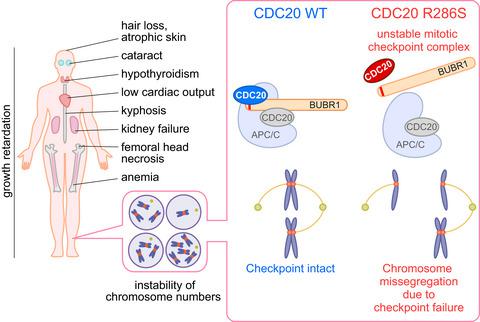当前位置:
X-MOL 学术
›
Aging Cell
›
论文详情
Our official English website, www.x-mol.net, welcomes your
feedback! (Note: you will need to create a separate account there.)
Premature aging syndrome showing random chromosome number instabilities with CDC20 mutation
Aging Cell ( IF 8.0 ) Pub Date : 2020-10-23 , DOI: 10.1111/acel.13251 Harumi Fujita 1, 2 , Takashi Sasaki 1, 3 , Tatsuo Miyamoto 4 , Silvia Natsuko Akutsu 4 , Showbu Sato 1 , Takehiko Mori 5 , Kazuhiko Nakabayashi 6 , Kenichiro Hata 6 , Hisato Suzuki 7 , Kenjiro Kosaki 7 , Shinya Matsuura 4 , Yoichi Matsubara 8 , Masayuki Amagai 1, 2 , Akiharu Kubo 1
Aging Cell ( IF 8.0 ) Pub Date : 2020-10-23 , DOI: 10.1111/acel.13251 Harumi Fujita 1, 2 , Takashi Sasaki 1, 3 , Tatsuo Miyamoto 4 , Silvia Natsuko Akutsu 4 , Showbu Sato 1 , Takehiko Mori 5 , Kazuhiko Nakabayashi 6 , Kenichiro Hata 6 , Hisato Suzuki 7 , Kenjiro Kosaki 7 , Shinya Matsuura 4 , Yoichi Matsubara 8 , Masayuki Amagai 1, 2 , Akiharu Kubo 1
Affiliation

|
Damage to the genome can accelerate aging. The percentage of aneuploid cells, that is, cells with an abnormal number of chromosomes, increases during aging; however, it is not clear whether increased aneuploidy accelerates aging. Here, we report an individual showing premature aging phenotypes of various organs including early hair loss, atrophic skin, and loss of hematopoietic stem cells; instability of chromosome numbers known as mosaic variegated aneuploidy (MVA); and spindle assembly checkpoint (SAC) failure. Exome sequencing identified a de novo heterozygous germline missense mutation of c.856C>A (p.R286S) in the mitotic activator CDC20. The mutant CDC20 showed lower binding affinity to BUBR1 during the formation of the mitotic checkpoint complex (MCC), but not during the interaction between MCC and the anaphase‐promoting complex/cyclosome (APC/C)–CDC20 complex. While heterozygous knockout of CDC20 did not induce SAC failure, knock‐in of the mutant CDC20 induced SAC failure and random aneuploidy in cultured cells, indicating that the particular missense mutation is pathogenic probably via the resultant imbalance between MCC and APC/C‐CDC20 complex. We postulate that accelerated chromosome number instability induces premature aging in humans, which may be associated with early loss of stem cells. These findings could form the basis of a novel disease model of the aging of the body and organs.
中文翻译:

早衰综合征显示 CDC20 突变的随机染色体数目不稳定性
对基因组的损害会加速衰老。非整倍体细胞的百分比,即染色体数量异常的细胞,随着年龄的增长而增加;然而,尚不清楚增加的非整倍性是否会加速衰老。在这里,我们报告了一个个体显示各种器官的过早衰老表型,包括早期脱发、皮肤萎缩和造血干细胞丢失;染色体数目不稳定,称为马赛克杂色非整倍体 (MVA);和主轴组件检查点 (SAC) 故障。外显子组测序鉴定了有丝分裂激活因子CDC20中 c.856C>A (p.R286S) 的从头杂合种系错义突变. 在有丝分裂检查点复合物(MCC)形成期间,突变体 CDC20 对 BUBR1 的结合亲和力较低,但在 MCC 与后期促进复合物/环体(APC/C)-CDC20 复合物相互作用期间则不然。虽然CDC20 的杂合敲除不会导致 SAC 失败,但突变体CDC20 的敲入会导致培养细胞中的 SAC 失败和随机非整倍性,表明特定的错义突变可能是致病性的,可能是由于 MCC 和 APC/C-CDC20 复合物之间的不平衡导致的. 我们假设加速的染色体数目不稳定性会导致人类过早衰老,这可能与干细胞的早期丧失有关。这些发现可以构成一种新的身体和器官衰老疾病模型的基础。
更新日期:2020-11-23
中文翻译:

早衰综合征显示 CDC20 突变的随机染色体数目不稳定性
对基因组的损害会加速衰老。非整倍体细胞的百分比,即染色体数量异常的细胞,随着年龄的增长而增加;然而,尚不清楚增加的非整倍性是否会加速衰老。在这里,我们报告了一个个体显示各种器官的过早衰老表型,包括早期脱发、皮肤萎缩和造血干细胞丢失;染色体数目不稳定,称为马赛克杂色非整倍体 (MVA);和主轴组件检查点 (SAC) 故障。外显子组测序鉴定了有丝分裂激活因子CDC20中 c.856C>A (p.R286S) 的从头杂合种系错义突变. 在有丝分裂检查点复合物(MCC)形成期间,突变体 CDC20 对 BUBR1 的结合亲和力较低,但在 MCC 与后期促进复合物/环体(APC/C)-CDC20 复合物相互作用期间则不然。虽然CDC20 的杂合敲除不会导致 SAC 失败,但突变体CDC20 的敲入会导致培养细胞中的 SAC 失败和随机非整倍性,表明特定的错义突变可能是致病性的,可能是由于 MCC 和 APC/C-CDC20 复合物之间的不平衡导致的. 我们假设加速的染色体数目不稳定性会导致人类过早衰老,这可能与干细胞的早期丧失有关。这些发现可以构成一种新的身体和器官衰老疾病模型的基础。











































 京公网安备 11010802027423号
京公网安备 11010802027423号